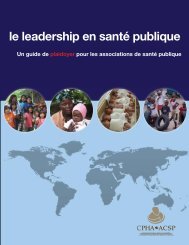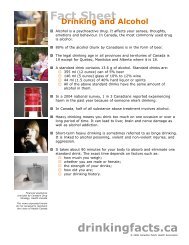Final Program - Canadian Public Health Association
Final Program - Canadian Public Health Association
Final Program - Canadian Public Health Association
Create successful ePaper yourself
Turn your PDF publications into a flip-book with our unique Google optimized e-Paper software.
10:30 – 16:00 Hall B (Assembly Level)<br />
EXHIBIT PROGRAM AND POSTER PRESENTATIONS<br />
Check out the 40+ exhibitors in our trade show along with the poster presentations... all in one room!<br />
11:00 – 12:30 Salon 9 (Meeting Level)<br />
CPHA POLICY FORUM<br />
Influencing <strong>Public</strong> <strong>Health</strong> Policy and Practice<br />
The Policy Forum is one of a number of policy development instruments used by CPHA. The Forum is used to advance<br />
CPHA policy activities by facilitating an exchange of ideas, promoting discussion and soliciting feedback regarding public<br />
health policy issues. It is your chance to get involved in policy development and advocacy by identifying important<br />
and/or emerging public health trends and issues, and providing input to guide future actions by the <strong>Association</strong>. Both<br />
CPHA members and non-members are welcome to participate!<br />
Moderator:<br />
* Erica Di Ruggiero, Chair, <strong>Canadian</strong> <strong>Public</strong> <strong>Health</strong> <strong>Association</strong><br />
11:00 – 12:30 Salon 4 (Meeting Level)<br />
PLANNED SESSION – CIHI-CPHI<br />
Using Deliberative Processes to Inform the Development and Application of Knowledge Syntheses<br />
Synthesizing and communicating knowledge about interventions that improve or safeguard the health of populations are<br />
complex tasks, becoming ever more challenging as knowledge increases. CIHI-CPHI and NCCHPP have developed<br />
methods for synthesizing policy-relevant knowledge, each incorporating deliberative processes as a key step in the<br />
process. The purpose of this session is to draw on the knowledge and experience of both organizations to introduce and<br />
explore the practice of using deliberative processes to inform knowledge creation, synthesis and communication as well<br />
as policy development. Participants will learn about recent work involving methods for analyzing and synthesizing<br />
knowledge on policies that influence healthy and sustainable environments. The session will include large group<br />
discussion focused specifically on different ways to approach deliberative processes as well as the challenges, merits, and<br />
potential for this method and other knowledge exchange activities to create and advance public health knowledge.<br />
Learning Objectives:<br />
* Recognize the benefits of deliberative processes and other knowledge exchange activities for creating knowledge in<br />
their own right;<br />
* Build an understanding of the use of deliberative processes and expert consultations to enhance knowledge synthesis work;<br />
* Increase knowledge of recent work from both the NCCHPP and CIHI-CPHI on synthesizing knowledge on public<br />
policy and using deliberative dialogue to enhance a scoping review method;<br />
* Learn some tips and tricks for conducting deliberative processes and consultation.<br />
Speakers:<br />
* Florence Morestin, Research Officer, National Collaborating Centre for <strong>Health</strong>y <strong>Public</strong> Policy<br />
* Karen Weir, <strong>Program</strong> Lead, <strong>Canadian</strong> Population <strong>Health</strong> Initiative, <strong>Canadian</strong> Institute for <strong>Health</strong> Information<br />
11:00 – 12:30 Salon 8 (Meeting Level)<br />
WORKSHOP<br />
Preparing for the Next <strong>Public</strong> <strong>Health</strong> Emergency: Principles for Effective Exercise Design<br />
<strong>Public</strong> health emergencies can materialize without warning within a very short period of time, as evidenced by the 2009<br />
H1N1 pandemic. The capability of a health care organization to respond effectively to a health emergency rests upon its<br />
degree of preparedness. By designing emergency management exercises that test and validate response plans, health<br />
care organizations can ensure they are prepared to provide the leadership required to meet the challenges of future<br />
public health emergencies. Participants will leave with an aide-mémoire and working templates to help them design a<br />
simple tabletop exercise in their workplace.<br />
Learning Objectives:<br />
* Describe the various types of exercises and explain their importance within a comprehensive exercise program;<br />
* Explain the exercise development cycle;<br />
* Identify specific organizational exercise priorities and describe why these areas would benefit;<br />
* Design a simple Tabletop Exercise.<br />
Speaker:<br />
* Yves Panneton, Senior <strong>Program</strong> Officer – Exercise Unit, Centre for Emergency Preparedness and Response, <strong>Public</strong><br />
<strong>Health</strong> Agency of Canada<br />
22 CPHA 2012 ANNUAL CONFERENCE FINAL PROGRAM





